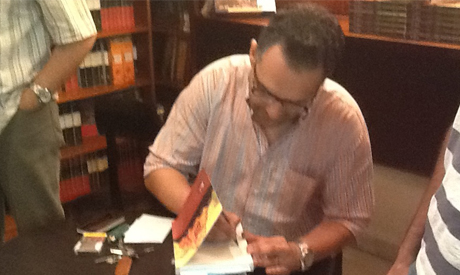 The new book by journalist Waleed Toghan tackles a topic heavily discussed these days: Salafists. The book, Salafists Also Go to Hell, published by Sefsafa Publishing, delves into the religious foundations of Salafists who are considered the most conservative Islamists.
The new book by journalist Waleed Toghan tackles a topic heavily discussed these days: Salafists. The book, Salafists Also Go to Hell, published by Sefsafa Publishing, delves into the religious foundations of Salafists who are considered the most conservative Islamists.
A discussion that took place on Thursday 5 July at Kotob Khan Bookstore based on Toghan's book featured a number of guests and speakers, and reviewed aspects of Salafist criticism not commonly discussed in public.
Toghan's experience as a journalist has focused on religious currents, and the book aims to pull Salafist thought into the realm of debate, rather than allowing it to stand beyond criticism as sacred. It should be discussed like any other current of religious thought offering itself as alternative to others, the author affirms.
In the introduction to the book, Toghan explains that the word "Salaf" refers to ancestors, and that while Islam as a religion tackles the human condition, and many religious schools evolved to reform society through religion, Salafisfs stop at the first three generations of Islam, ignoring all developments in Islamic thought since then. An important role of religion, according to Toghan, is to be able to absorb and adapt to societal changes, but this is completely ignored by the "Salafist call."
Toghan recalls that even in the early days of Islam, the disciples of the Prophet Mohammed had disputes among themselves regarding interpretation, and therefore establishing a foundation from this time requires some choices still. "If Islam was Salafist in thought, early Muslims wouldn't have gone through early debates on interpreting the Quran," Toghan concludes.
Samer Soliman, professor of political economy at the American University in Cairo (AUC) and a participant in Thursday's discussion, explained that Toghan's book addresses both the foundations of Salafist thought and the societal impacts of that thought. But he complained that the introduction didn't offer enough explanation on how the book has been designed. Also lacking in the book is a definition of Salafists who, as Soliman described, come from various backgrounds and sometimes disagree amongst themselves, while they are evolving although they refuse to admit it. The conclusion that Toghan reaches about the inevitability of a clash between Salafists and the rest of society is not fully supportable, according to Soliman. He added that sections in the book on the history of the first converts need to be expanded.
Toghan responded that the Hadith (recalled stories about the life and sayings of the Prophet Mohammed) present many challenges in that they were written after the Prophet Mohammed's death, and many of the 596,000 stories were not fully documented. Imams later disagreed about the number of fully supported Hadiths, while the number of better documented stories are only a fraction of the whole.
Ashraf El-Sherif, professor of political science at AUC, started by correcting some inaccurate factual assertions contained in the book, but moved to assert that the overall question addressed by the book isn't clear, explaining that the word Salafist has changed across history, and that at times the word was used to describe more modernist Islamists and reformers, while the current Egyptian Salafist schools were only founded in the 1970s. El-Sherif pointed out that while Toghan suggests that authorities set certain boundaries to Islamist thought, he objects when Salafists assert their religious authority. El-Sherif offered a definition of contemporary Salafists: a unilateral approach to religion, lending themselves purely to literal interpretations of religious text.
Debate among attendants ensued about the definition of popular religion and how Salafism refuses the historical accumulation and diversification of religion. El-Sherif explained that Ibn Taymeya and Ibn Al-Kayem are the main religious references for Salafists, although they themselves would argue that nothing is a reference but the Quran and the Sunna. On the distinction between secular law and Sharia law, there was disagreement on whether current law is consistent or inconsistent with Sharia law, and no clarity was established on this topic.
The Salafists present among the audience tried hard to present their point of view about the "certainty" of the Hadith and the thought of the old Salaf. El-Sherif, however, went on to explain that Salafists, who had believed that politics is corrupt and that democracy isn't compatible with Islam, themselves began to participate in founding political parties and participating in elections, asking their women to vote, setting aside their beliefs as unsuitable to current day conditions.
The debate clarified the extent of contention present in discussion between Salafists and other Muslims, where the former deeply believe that they hold the truth, carrying strong faith in their leaders' sayings and allowing no real conversation to take place on a number of issues of importance to all Muslims.



